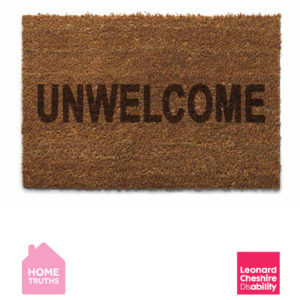 GPs spent in total the equivalent of 15,000 hours – or six working years – last month dealing with disabled and older patients who have suffered preventable injuries, illness or other health problems because they live in inaccessible homes, according to charity Leonard Cheshire Disability.
GPs spent in total the equivalent of 15,000 hours – or six working years – last month dealing with disabled and older patients who have suffered preventable injuries, illness or other health problems because they live in inaccessible homes, according to charity Leonard Cheshire Disability.
The new findings from a poll of over one thousand UK GPs found that 95% of them have patients with health problems related to inaccessible homes.
The charity also found that nearly 3% of GPs total caseloads relate to inaccessible housing.
If true of all GPs, Leonard Cheshire Disability estimates the health cost to be the equivalent of around £300m every year.
According to the charity, thousands of disabled and older people are trapped in unsuitable homes, and unable to move around freely.
Many people are confined to a limited number of downstairs rooms and face the daily nightmare of washing in their kitchen, sleeping in their living room, using a commode for a toilet, and not being able to get in and out of their front doors.
Inaccessible housing can lead to physical injuries, such as trips and falls, as well as mental health problems.
Sally-Anne Walker, 50, lives in an inaccessible home with her husband Steve and two children in Southampton. Sally has chronic lymphedema which severely affects her walking
She is unable to go upstairs in her home and is forced to spend all her time in the living room, including using a faulty portable toilet. She has not been outside her home for two years.
“I tripped in a narrow part of my home and suffered a bad fall last year,” she said. “It took eight paramedics three hours to lift and move me from the house into an ambulance.
“A lot of my health problems are related to my home – it’s really depressing. I rely on my GP to come out and see me when I need it most but often he’s not able to.”
Another person facing severe difficulties is Stacie Lewis, 42, who lives in a privately rented flat in London. Stacie has leukaemia and her daughter May, 5, is severely brain-damaged, being unable to walk or even sit up.
“Life can be difficult,” she said. “I’m too weak to carry my daughter upstairs. She’s a growing girl who cannot walk or even throw an arm around the person carrying her so my daily routine can be stressful and exhausting.
“Even with the combination of my cancer and my daughter’s disabilities, we have not even been placed in the top band of our council’s housing waiting list and will probably be waiting for years.
“I need to see my doctor regularly about the pain caused from carrying my daughter around the flat, and they’re really concerned it’s affecting my ability to fight the cancer.”
Clare Pelham, chief executive of Leonard Cheshire Disability, said:
“For many of us, our homes are a haven; places where we look forward to relaxing with our friends and family. For many thousands of disabled and older people, their homes are a danger to their health and wellbeing.
“It is shocking that GPs are spending precious time on injuries and illnesses directly related to inaccessible homes at a time when there’s overwhelming pressure on our health care system.
“And yet it would cost absolutely nothing for the Government to require all new homes to be built to accessible standards.
“With our ageing population and an increase in the number of disabled people, these homes are needed now. We literally cannot afford to wait while disabled and older people are suffering.”
Dr Maureen Baker, chair of the Royal College of General Practitioners, said:
“GPs treat the whole person, so we are only too aware that inaccessible or inadequate housing can have a negative impact on our patients’ physical and mental health.
“General practice is currently under huge pressure dealing with the demands of a growing and ageing population with decreasing resources and a chronic shortage of GPs.
“We need at least 10,000 more GPs across the UK by 2020 to keep up with demand, so it goes without saying that the service we could provide for our patients with an extra 15,000 working hours every month, is immense.
“We want what is best for our patients, and taking steps to ensure that they can live safely in their homes without constant fear of an accident will not only be good for them, but – as this research shows – will help reduce pressure on general practice and the NHS as a whole.”
As part of its Home Truths campaign, Leonard Cheshire Disability is calling on the Government to ensure all new homes are built so they are easy to adapt (known as Lifetime Homes) if people become disabled. The charity also wants 10% of large developments to be fully wheelchair accessible so that disabled people can live independently and safely.

